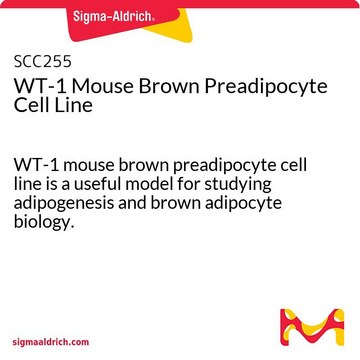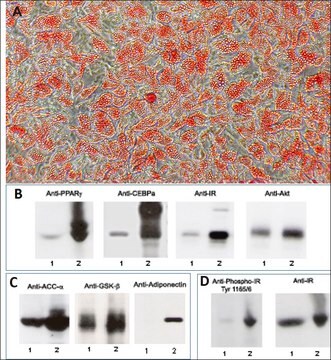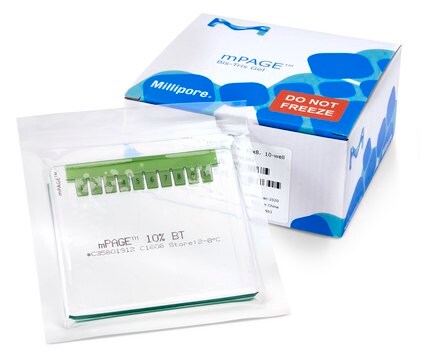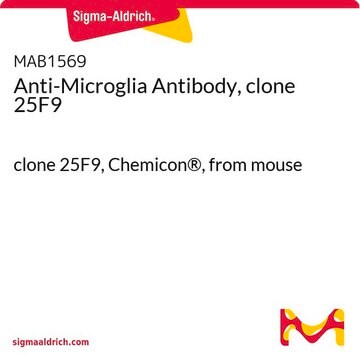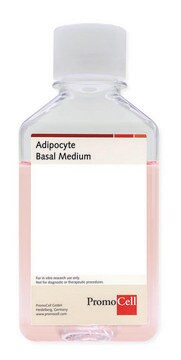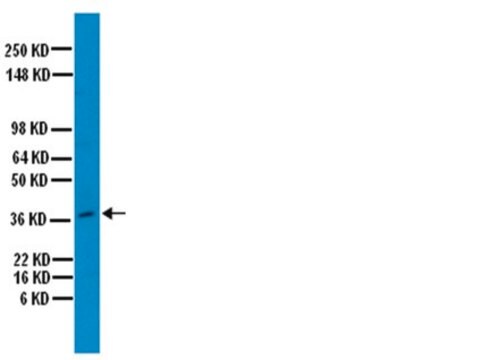SCC250
T37i Mouse Brown Adipocyte Cell Line
T37i mouse brown adipocyte cell line is a versatile model for metabolic and functional studies of brown fat.
Synonim(y):
Linia komórkowa brązowych adipocytów
Zaloguj sięWyświetlanie cen organizacyjnych i kontraktowych
About This Item
Kod UNSPSC:
41106514
NACRES:
NA.81
Polecane produkty
Zastosowanie
cell analysis
Opis ogólny
Brown adipose tissue (brown fat) has generated intense research interest due to its unique thermogenic properties and potential applications for development of treatments for metabolic diseases (1). Cellular models that reliably reflect the transition of preadipocytes to brown fat are necessary tools for investigating the mechanisms and roles of brown fat in metabolic systems.
The T37i cell line is a rapidly proliferating brown preadipocyte cell line derived from a mouse hibernoma. Differentiation of T37i cells into brown adipocytes occurs when incubated with triiodothyronine (T3) and insulin over 3-6 days. Differentiation can also be induced by incubation with steroid hormones such as aldosterone, which induces differentiation through its interaction with mineralocorticoid receptor (MR). Mature brown adipocytes are characterized via triglyceride accumulation, morphology, and expression of early adipogenic genes (2). Differentiated T37i cells express the thermogenic uncoupling protein 1 (UCP1) and exhibit lipid droplet accumulation.
<bold>Source:</bold>
The T37i cell line was derived from a hibernoma (malignant brown fat tumor) of a transgenic mouse carrying a hybrid gene composed of the human MR proximal promoter linked to the SV40 large T antigen (1).
Research Category:
Metabolism
The T37i cell line is a rapidly proliferating brown preadipocyte cell line derived from a mouse hibernoma. Differentiation of T37i cells into brown adipocytes occurs when incubated with triiodothyronine (T3) and insulin over 3-6 days. Differentiation can also be induced by incubation with steroid hormones such as aldosterone, which induces differentiation through its interaction with mineralocorticoid receptor (MR). Mature brown adipocytes are characterized via triglyceride accumulation, morphology, and expression of early adipogenic genes (2). Differentiated T37i cells express the thermogenic uncoupling protein 1 (UCP1) and exhibit lipid droplet accumulation.
<bold>Source:</bold>
The T37i cell line was derived from a hibernoma (malignant brown fat tumor) of a transgenic mouse carrying a hybrid gene composed of the human MR proximal promoter linked to the SV40 large T antigen (1).
Research Category:
Metabolism
Pochodzenie linii komórkowej
Mouse, Adipocytes
Opakowanie
≥1X106 cells/vial
Przechowywanie i stabilność
Store in liquid nitrogen. The cells can be cultured for at least 10 passages after initial thawing without significantly affecting the cell marker expression and functionality.
Inne uwagi
This product is sold solely for research use per the terms of the “Restricted Use Agreement” which govern its use as detailed in the product Data Sheet or Certificate of Analysis. For information regarding any other use, please contact licensing@emdmillipore.com.
Oświadczenie o zrzeczeniu się odpowiedzialności
This product contains genetically modified organisms (GMO).
Within the EU GMOs are regulated by Directives 2001/18/EC and 2009/41/EC of the European Parliament and of the Council and their national implementation in the member States respectively. Unless otherwise stated in our catalog or other company documentation accompanying the product(s), our products are intended for research use only and are not to be used for any other purpose, which includes but is not limited to, unauthorized commercial uses, in vitro diagnostic uses, ex vivo or in vivo therapeutic uses or any type of consumption or application to humans or animals.
Within the EU GMOs are regulated by Directives 2001/18/EC and 2009/41/EC of the European Parliament and of the Council and their national implementation in the member States respectively. Unless otherwise stated in our catalog or other company documentation accompanying the product(s), our products are intended for research use only and are not to be used for any other purpose, which includes but is not limited to, unauthorized commercial uses, in vitro diagnostic uses, ex vivo or in vivo therapeutic uses or any type of consumption or application to humans or animals.
Ta strona może zawierać tekst przetłumaczony maszynowo.
Kod klasy składowania
10 - Combustible liquids
Klasa zagrożenia wodnego (WGK)
WGK 1
Temperatura zapłonu (°F)
Not applicable
Temperatura zapłonu (°C)
Not applicable
Certyfikaty analizy (CoA)
Poszukaj Certyfikaty analizy (CoA), wpisując numer partii/serii produktów. Numery serii i partii można znaleźć na etykiecie produktu po słowach „seria” lub „partia”.
Masz już ten produkt?
Dokumenty związane z niedawno zakupionymi produktami zostały zamieszczone w Bibliotece dokumentów.
Nasz zespół naukowców ma doświadczenie we wszystkich obszarach badań, w tym w naukach przyrodniczych, materiałoznawstwie, syntezie chemicznej, chromatografii, analityce i wielu innych dziedzinach.
Skontaktuj się z zespołem ds. pomocy technicznej